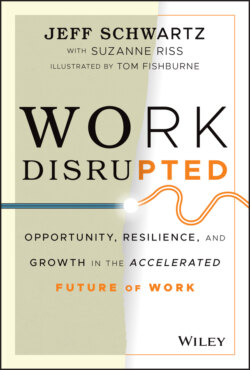Читать книгу Work Disrupted - Jeff Schwartz - Страница 14
CHAPTER 1 From Fear to Growth : Mindsets and Playbooks for Twenty-first-century Careers and Work
ОглавлениеWhen we least expect it, life sets us a challenge to test our courage and willingness to change; at such a moment, there is no point in pretending that nothing has happened or in saying that we are not yet ready. The challenge will not wait. Life does not look back.
—Paulo Coelho, novelist1
When the coronavirus pandemic took root in the United States, we entered a time machine to the future.2 Practically overnight, people in industries that had restricted telecommuting found themselves crawling out of bed and dialing into Zoom conference calls from their couch. For many teachers, bankers, lawyers, even NASA aerospace engineers, the coronavirus crisis was a trial run for remote work.3 With most of the country under orders to shelter in place, many business leaders pivoted on a dime to reimagine products, reassign workers, reshape supply chains, and reconfigure operations to join the heated race to save lives. Near the top of the critical list of needs was the demand for ventilators, potentially hundreds of thousands of ventilators. In an unprecedented move, Ford and General Motors shut down car production and went into the ventilator production business.4
Overhauling production and ramping up that production beyond anything your company has ever done before are feats of magic that business leaders have known they would be expected to perform in the future world of work. When Anne-Marie Slaughter, the chief executive of New America, said the coronavirus exposed “an opportunity to make the changes we knew we were going to have to make eventually,” and also “deep fissures and failures in our culture,” she captured both the sense of inevitability and vulnerability that many business leaders were experiencing.5 They knew the future world of work would require boosting efficiency, proceeding at warp speed, seeking talent and expertise outside the walls of their organization, and a heavy dose of resourcefulness. However, they did not realize the future would arrive wholesale and so soon. After all, in survey after survey, business leaders consistently reported they did not feel ready for the future of work.6
Enter the coronavirus pandemic, an abrupt fast-forward to the future of work. Changes expected to take decades, occurred within weeks. Slaughter, a former director of policy planning for the U.S. Department of State, declared that with the pandemic “the future of work is here.”7 Indeed, the coronavirus has illustrated both the extreme challenges and inspiring possibilities ushered in by a future that swept in sooner than expected.
